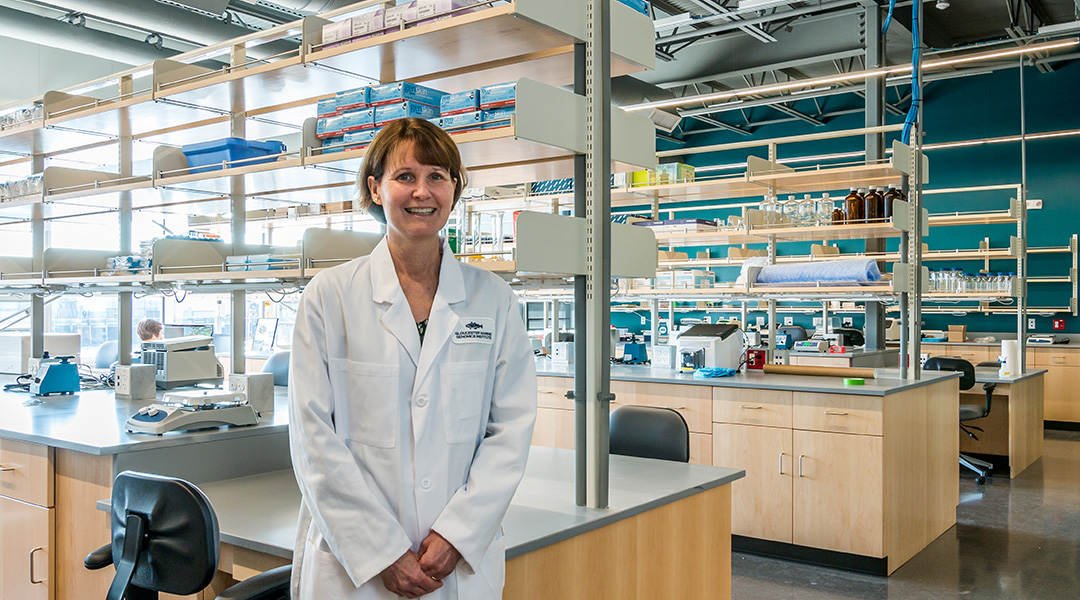In the quiet coastal city of Gloucester, Massachusetts, better known for The Perfect Storm and the Gorton’s fisherman than its research facilities, biochemist Andrea Bodnar is at the helm of the Gloucester Marine Genomics Institute (GMGI), where her work focuses on tackling some of the most critical questions at the interfaces between oceans and humanity.
As T.S. Eliot eloquently reminds us, Earth’s oceans have always been a focal point for a sizeable fraction of the human population, and have also frequently borne the brunt of the negative impacts of modern human activity.
Bodnar, a biochemist by training, draws on a diverse range of experience and expertise as the science director of GMGI, a role she has filled since 2017. Such a breadth of experience is necessary to lead the research programs of an institute whose efforts range from highly targeted studies like the sequencing of the lobster genome to exploring the vast genetic diversity of critically important Marine Protected Areas like the Stellwagen Bank National Marine Sanctuary.
Prior to joining GMGI, she had been in Bermuda studying the molecular mechanisms that enable the longevity of marine invertebrates like certain species of sea urchin. This important line of research continues at GMGI with the aim of discovering insights that can ultimately be used to prevent or treat age-related diseases in humans.
A city whose past, present, and future are inextricably linked to the ocean is an appropriate setting for Bodnar to carry out her work, which does not end with the current generation of researchers already in labs.
The Gloucester Biotechnology Academy at GMGI trains high school graduates for entry-level positions in biotechnology and life science laboratories. Over the course of two semesters and a 12-week paid internship, students learn not only how to work in a lab but the entire suite of skills necessary to guide a new generation of scientists into their own fruitful careers.
As the city of Gloucester celebrates the 400th anniversary of its founding and GMGI its 10th, we sat down with Bodnar to discuss her role at GMGI, her favorite marine invertebrates, and her advice for up-and-coming researchers.
What is the Gloucester Marine Genomics Institute?
GMGI was founded in 2013 as a not-for-profit whose ambitious mission is to “address critical challenges facing our oceans, human health, and the environment through innovative scientific research and education”.
Located in the heart of America’s oldest fishing port, GMGI is fulfilling its mission through a distinct, three-pronged strategy, which includes research, education, and science community. GMGI’s research institute uses cutting-edge molecular and genomic techniques to promote sustainable and healthy oceans and to uncover new discoveries that impact fisheries and human health.
Our Gloucester Biotechnology Academy flagship vocational program educates high school graduates for careers as biotech lab technicians, with a lab-immersion curriculum and paid internships. The Academy also offers educational programs to middle and high school students. GMGI is actively promoting conditions that encourage the development of a scientific community in and around Gloucester by hosting conferences and forging collaborative partnerships.
By bringing world-class science and transformative workforce development to Gloucester’s historic waterfront, GMGI is catalyzing the regional economy.
What are the main areas of focus for current research at GMGI?
GMGI’s science strategy uses a platform of genomics to address questions related to oceans and human health with three focus areas: ecosystem function and health, fisheries and aquaculture, and biomedicine and biotechnology.
The ecosystem function and health program explores the ocean’s vast biodiversity to understand its dynamics, resilience, and ability to adapt to change. Our fisheries and aquaculture program applies genetic and genomics approaches to better understand population structure and health of commercially important fish and shellfish. Our biomedicine and biotechnology program is exploring the unique adaptations of marine organisms to inspire new discoveries that impact human health.
Can you say a bit more about marine invertebrates and why they are of interest to researchers? Do you have a “favorite” organism to study and work with?
Marine invertebrates play a critically important role in shaping healthy marine ecosystems and have amazing adaptations that enable them to thrive in their ocean habitats. Many of these adaptations make marine invertebrates ideal models to study fundamental biological processes, including those relevant to human health.
As an example, seven Nobel Prizes have been awarded for work done using marine invertebrates as models that have expanded our understanding of cellular immunology (sea star), nerve conduction (squid), photoreceptor function (horseshoe crab), respiratory burst and cell cycle control (sea urchins), learning and memory (sea hare) and applications of green fluorescent protein (jellyfish). As models for biomedical research, the sheer diversity of species with a vast array of unique adaptations offers endless choices to address biological questions.
My particular interest is in the long-lived marine invertebrates and my “favorite” research model is the sea urchin. Some species of sea urchins can live to extraordinarily old ages, more than 100 years, without showing signs of aging and no reported cases of cancer. My research program is focused on using sea urchins as models to understand the cellular and molecular mechanisms underlying extreme longevity, negligible aging, and naturally occurring resistance to cancer.
Because sea urchins share a close genetic relationship with humans, we hope that insight gained from studying these animals will translate to preventative or therapeutic strategies for human age-related degenerative diseases and cancer.
Much of what reaches the general public about environmental/ecological/climate issues and related research is focused on the prevalent problems in these areas. Can you comment on some positive developments or successes in your time at GMGI, either/both at GMGI and in the broader world of coastal/marine research?
The application of genomics is beginning to provide a comprehensive understanding of the diversity and dynamics of life in the sea and is enabling the creation of new tools to monitor and promote sustainable management of the marine environment.
At GMGI we are developing and applying new molecular genetic technologies such as environmental DNA (eDNA) and CRISPR-based molecular diagnostics to promote sustainable fisheries and help enhance management practices in threatened and protected marine ecosystems.
What are the major collaborative efforts that GMGI is involved in? Academic, industrial, government, etc.
GMGI has a number of ongoing collaborations with academic, government, and industry partners, leveraging our unique marine resources and specialized genomics expertise to advance important research questions. We recognize the power of collaboration and cross-disciplinary interactions that bring together diverse backgrounds, knowledge, and skills to spark innovative new solutions to the challenges facing our oceans and lead to breakthroughs that impact human health.
What is your intermediate- to long-term vision for the future of GMGI and its role in coastal/marine science?
GMGI’s vision has brought together pioneering scientists, regional biotechs, community leaders, successful business people, and committed educators — all dedicated to our mission. I am excited to see GMGI continue to grow and lead a new era of marine innovation on Gloucester’s historic waterfront. I envision breakthrough discoveries powered by genomics with positive impacts at regional, national, and global scales to better understand and protect our oceans, and to promote sustainable use of precious ocean resources for the benefit of humanity.
If you could offer one suggestion or piece of advice to the next generation of (marine) scientists, what would it be?
Follow your passion, stay curious, be creative and collaborative. Don’t be discouraged by unexpected results. These can sometimes lead to the most exciting discoveries that challenge our thinking and provide new insight.

















